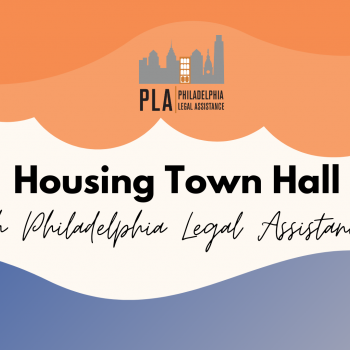25 Years of Centering Community: Building Equity for Side Yard Caretakers

We're celebrating 25 years of centering community and paving a path towards justice. PLA uses creative and innovative legal aid to improve the lives of real Philadelphians. This last year we added an incredible new way to help expand equity to long-time Philadelphians.
In the Fall of 2021, Philadelphia Legal Assistance welcomed an Independence Fellow, Andria Bibiloni, to work with our Consumer Housing Unit. Andria, a graduate of Temple University’s Beasley School of Law, has joined PLA to assist predominantly Latinx homeowners in North Philadelphia gain titles to home-adjacent vacant properties to preserve their neighborhoods and protect generational family wealth.
This new initiative at PLA is a pilot program that recognizes a unique need for long-time residents in the face of gentrification in the 19122 and 19133 Zip Code areas. For decades, many vacant lots in these areas were abandoned and fell to blight. Local residents took care to clean the lots and transform them into safe spaces to grow food, let children play, and enjoy outdoor space in the neighborhood. As gentrification ramps up, these properties are now rapidly being auctioned and seized for new development. Under the Pennsylvania law of adverse possession, many lot stewards have acquired a right to own the property, but lack the resources to hire a lawyer to bring an action to quiet title. Recognizing this issue is a way for PLA to help homeowners with claims to home-adjacent properties secure the equity they earned from decades of caring for these properties, while aiding in neighborhood preservation.
What if a person has been taking care of a home adjacent property and doesn’t know who owns it, or thinks they own it but someone else argues otherwise? The first step is to go to property.phila.gov and look up the basic property information. The website will tell you who is the record owner according to the Office of Property Assessment (OPA). Homeowners should pay close attention to the lot lines of their home and see if the yard is part of the same lot, or if it is a separate lot. A legal services assistant can help locate the deed to the property and check to see if there were any recent transfers.
If the property is owned by the Land Bank rather than an individual, there are specific steps to take in order to gain legal ownership. In order to be eligible for the Land Bank’s side lot program, both the applicant and the side lot must meet certain criteria. The property must touch the applicant’s house on the side or rear and must be designated as “side yard eligible.” A legal services assistant can help determine potential eligibility and guide the application process. If it’s a Land Bank property, the yard may be purchased for $1, but the purchase must be approved by the Land Bank Board and City Council. The owner has to pay property taxes and the property comes with a 30-year mortgage for the fair market value determined by an appraiser. If sold before the end of 30 years, the whole amount is due back to the City. There are also many restrictions on the use of the property and it must be maintained as a garden.
If the vacant lot is owned by an individual, the pathway to ownership depends on the specific facts and circumstances surrounding the property. For example, if a family member was the record owner, the side lot caretaker may already have an ownership interest in the property as an heir. If the record owner is a stranger, the side lot caretaker may have a claim for adverse possession against the record owners or heirs of the property if they can prove actual, exclusive, hostile, continuous, open, and notorious possession for a period of 21 years or more. Otherwise, they may explore other options, like purchasing the property from the record owner, asking the Land Bank to acquire it, or petitioning for conservatorship.
When a property is privately owned, all the back taxes and liens will become the new owner’s responsibility. If the City or its property tax collections agents have already filed a tax foreclosure petition to collect the outstanding debt by auctioning the property at a Sheriff sale, a person must pay in full or obtain a payment agreement in order to avoid the sale, but paying the back taxes will not result in ownership Separate legal action must be taken to obtain title to the property. There may also be liens for unpaid stormwater fees on the property.
Do you need help with side or rear yard property ownership? Call the Save Your Home Philly Hotline at 215-334-HOME (4663) between 9:00 a.m. and 5:00 p.m., Monday through Friday. A paralegal will determine your eligibility and take your information. If you are eligible by income guidelines, a lawyer may be able to assist you. If not, try contacting the Lawyer Referral and Information Service.
To learn more about side and rear yard ownership issues from Andria, watch our Facebook live conversation here: https://fb.watch/bcP1nuhEMR/

